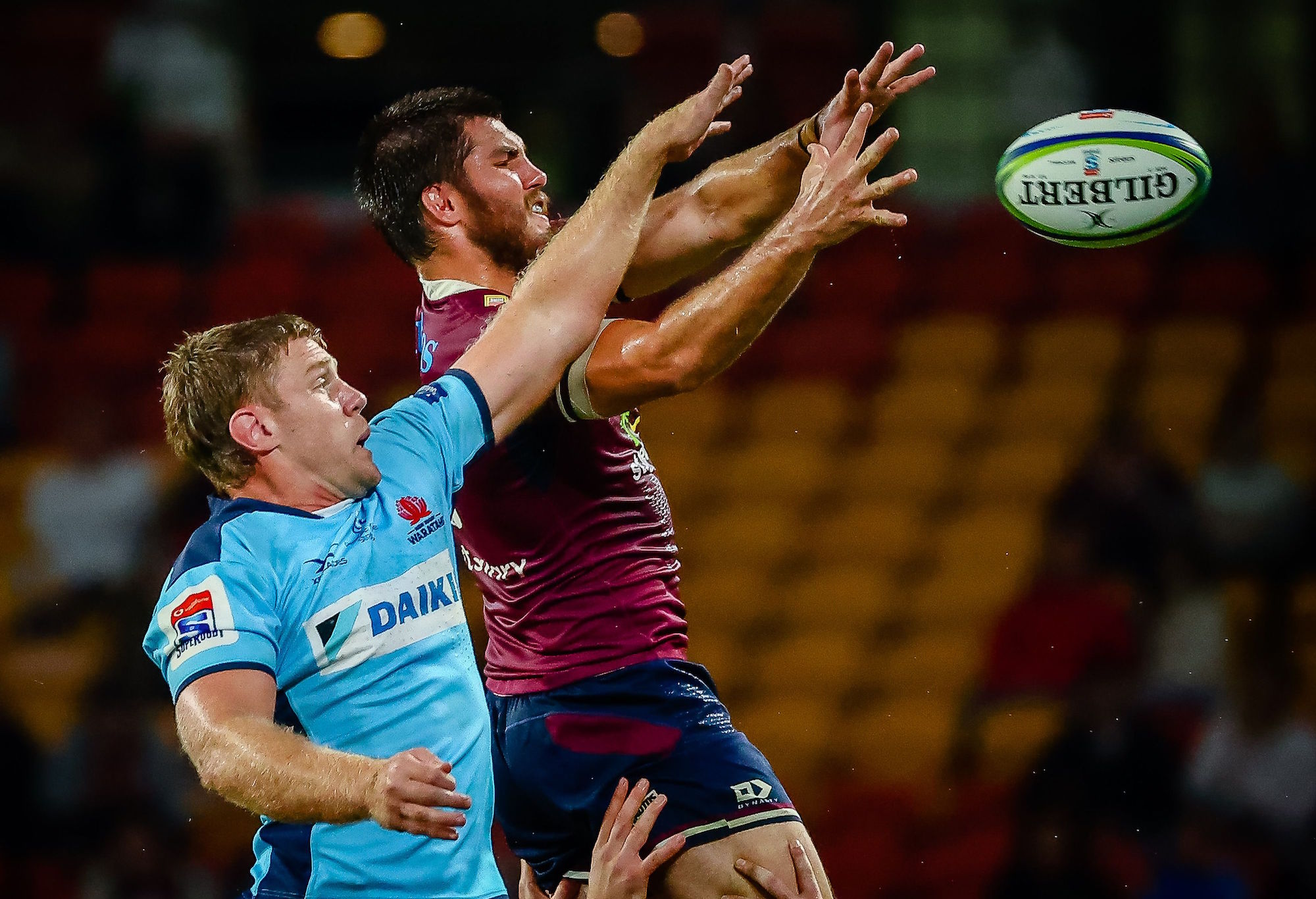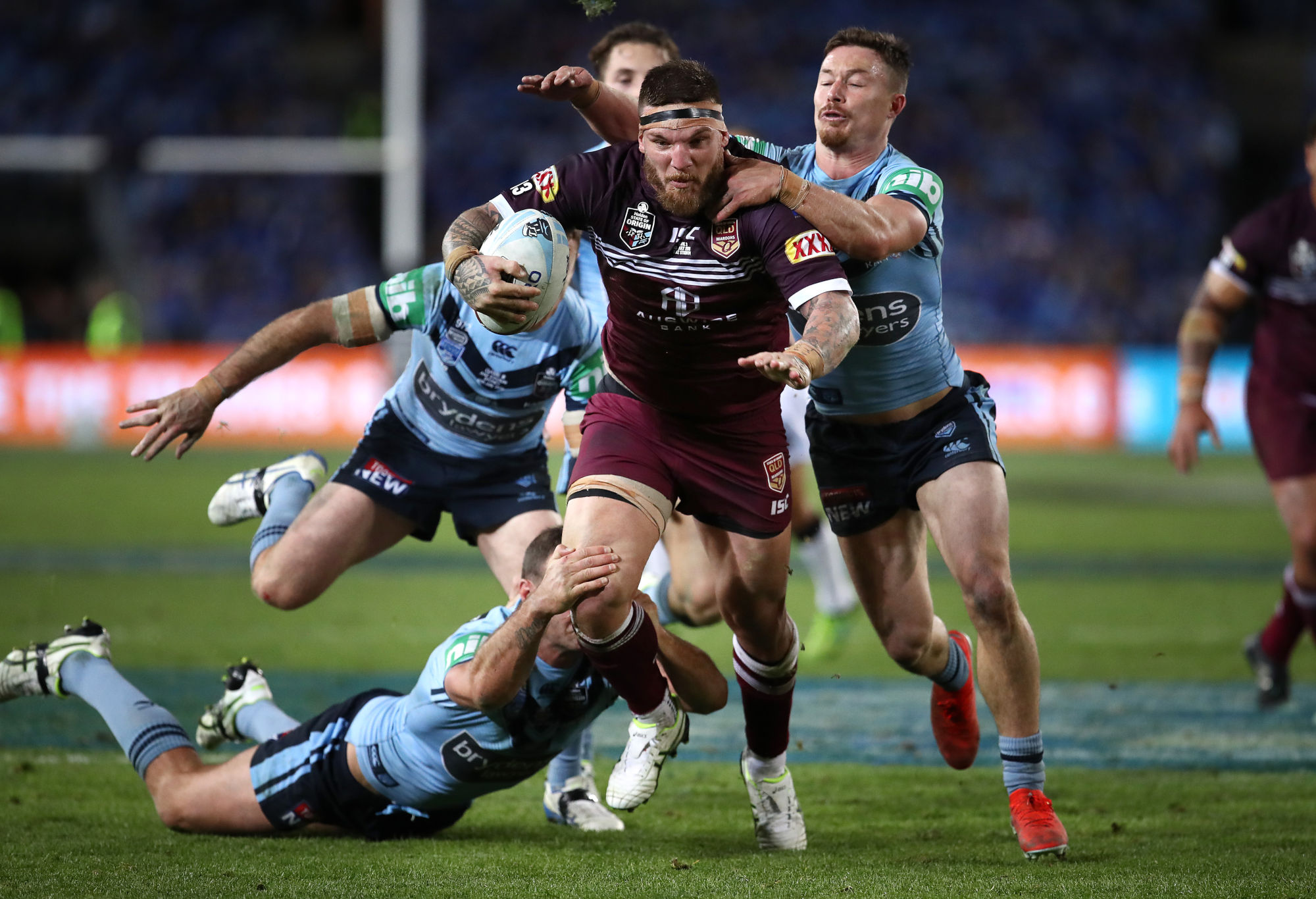When Hamish McLennan and Rob Clarke unveiled rugby’s big and diverse new broadcast package this week it was seen by many as a statement that the game is still here and will do whatever it takes to remain relevant and pertinent.
The offering is broad and complicated and a lot of it requires forward-thinking from a flexible mindset given so much about the future is uncertain.
Yet one thing that has been a point of speculation for so long seems now to be part of the official offering: the State of the Union, which is essentially State of Origin by another name.
At first look this seems a wonderful idea considering the NRL equivalent is Australia’s most-watched television event and has the ability to sell out stadiums all across the nation. Indeed one wonders why rugby have waited this long to try and emulate it.

(Photo by Patrick Hamilton/AFP via Getty Images)
Some of the reluctance and pushback is understandable: ‘rugby encompasses the whole of Australia, not just two states’, and, ‘We risk devaluing the international game’ are lines of thinking often trotted out when an Origin-style contest is considered for rugby, yet it appears the appeal of a match that attracts nearly three million sets of eyes every time it’s played is too big an attraction not to at least emulate.
The mere proposal of an idea like this was an immediate success, with instant coverage in News Corp papers and websites – a company supposedly meant to be hostile towards Rugby Australia – and much discussion from fans of both league and union fans.
Yet on closer inspection this concept strays from Origin as we know it. When spruiking the new broadcast deal Hamish McLennan stated that the game would involve players from outside of New South Wales and Queensland through the form of a televised draft. That isn’t Origin; that is something entirely different.
The beauty of Origin is its simplicity. Two teams full of players going back to where their sports careers started, tearing lumps out of each other. Because the game represents heritage, there is always something to play for, and whether it be crowds, ratings or merchandise sales, every metric reflects the game’s success.

State of Origin just works (Photo by Ryan Pierse/Getty Images)
Many argue that rugby doesn’t need an engaging domestic representative because the game has such a broad and popular international component. Yet evidence suggests that trying to push the ‘rugby is growing globally’ line isn’t resonating with many Australians. The fact is a lot of sports can’t afford and don’t desire to see a packed Twickenham, Millennium or Newlands, and it has been a long time since the Wallabies filled Olympic Park and had a team stacked with national icons.
Recently it seems that club, grassroots and provincial rugby have been seen as the ingredients of the Wallabies cake. Perhaps now it’s time we see these elements as the cake itself and the Wallabies as the icing.
It will be a challenge for rugby to set this game apart from any other Reds vs Waratahs encounter, but as stated earlier, the media is paying attention and very eager to talk about this concept. If it goes ahead, rugby needs to work hard to get the eligibility criteria spot on, with players willing to give their all for their state.
Yes, there were times when the NRL got this drastically wrong – names like Greg Inglis and Tony Carroll come to mind – but they have since tried hard to arrest this. Rugby Australia has a much smaller group of top-class players to pick from but still must resist padding out the teams with players from Perth, Melbourne and Fiji.
The NRLW manage to pick their Origin squads from four clubs, one of which is mostly ineligible New Zealanders, and the game still attracts over a million viewers, so it can be done when all those involved buy into the idea.
Though I am a huge NSW fan and I write this from the standpoint of someone who resides in Western Sydney, my origin lies in Thessaloniki, where I was born and lived until I was 11. Desperate to integrate seamlessly and quickly, my father sought the advice of colleagues of his in the Greek navy who told him that Sydneysiders love rugby. The fact there were two distinct codes was lost in translation, which is how I ended up playing rugby union as a kid, yet at my local public school each winter the talk of Origin swept up all and I couldn’t help but become enraptured by the game, which is why both my son and daughter now play league.
Origin thrives in places like Western Sydney, a place in which rugby has traditionally struggled.
Ultimately the success of an enterprise like this lies with the players and coaches hyping the game like crazy. The mention of Origin will have the media paying attention, and it’s up to those involved to get their faces in front of the cameras selling stories. Punching may be a thing of the past, but the State of the Union series needs its own Arthur Beetson-Mick Cronin story, something that will launch the game into Australian sports folklore.
If you look at the viewing numbers of the current Super Rugby AU season, it points out that games involving New South Wales or Queensland rate far higher than games that don’t, so don’t the two biggest rugby states in Australia deserve a game that celebrates this fact while also taking the fight to the NRL?
Rugby is at a pivotal time in its history in this country. The new broadcast deal will cement its future, and it should have an event that stretches its viewership beyond traditional audiences and packs stadiums.
from The Roar https://www.theroar.com.au/2020/08/27/why-rugby-risks-getting-the-state-of-the-union-all-wrong/


0 Comments